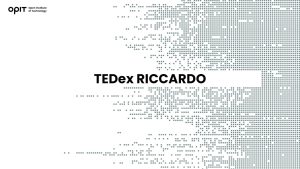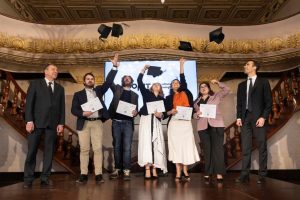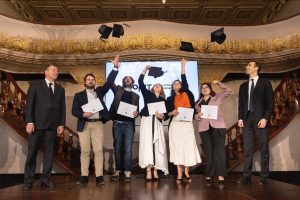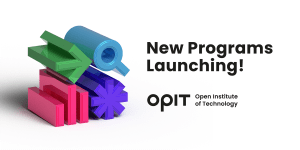In May 2025, Riccardo Ocleppo, founder of the Open Institute of Technology (OPIT), gave the audience at TEDx Parma in Italy an insight into why he created OPIT, a new type of university that is quickly becoming essential in preparing students for an increasingly technological future.
Meet Riccardo
Although Riccardo graduated from Politecnico di Torino with a bachelor’s in electronic engineering in 2006 – followed by a master’s degree in 2008 – he felt unprepared for the challenges he felt he had to face as a professional. He sought to expand his vision by completing the master’s program at the London School of Business.
While studying in London, Riccardo became focused on how he could help other students optimize their studies and ensure they were properly prepared for their futures. This resulted in the creation of Docsity, an international online community where university students could exchange study materials to prepare for exams.
Docsity has grown into a global community with 15 million registered students. Moreover, it partners with over 250 universities and business schools worldwide that interview students and provide that information to educational organizations to help them refine their offerings. This experience of working as a conduit between students and universities shaped Riccardo’s understanding of the higher education sector’s needs, eventually leading to the creation of OPIT.
The Challenges Facing Higher Education
In his TEDx talk, Riccardo asked the Parma audience to imagine themselves on their first day of university – sitting in their classroom as their professor explains the concepts that they will learn over the coming years, designed to prepare them for the future.
But, he asked, how long will the skills in your curriculum be relevant? In the past, the skills learned at university would last someone for the rest of their professional lives. But today, with technology changing faster than ever, we have reached the point where we can’t accurately predict what technologies we will be using in five years. It is even more challenging, he said, to predict what kind of knowledge children sitting in classrooms today will need when they reach adulthood.
The inability to predict the skills that students will need in the future or adapt courses quickly enough to include those skills is why many university degrees are no longer fit for purpose, Riccardo explained. Instead, he stated, they are preparing students for a destination that will no longer exist when they graduate while pushing them over a road with a constantly moving target destination.
Building OPIT
With these challenges and his experiences from Docsity in mind, Riccardo set to work designing the kind of education he wished that he had received. He set out to create a university that would allow learners, at any stage in their career, to adapt and reinvent themselves for the changing world. The result was OPIT, which matriculated its first students in 2023.
With that in mind, OPIT courses are built around three pillars.
Pillar One: Bridging Theory and Practice
Universities often produce students with excellent theoretical knowledge of a subject area but with limited ability to apply that knowledge to real-world problems. It is how Riccardo felt about his knowledge and skills when he completed his electronic engineering degree.
OPIT degrees, on the other hand, are designed to provide students with not only a strong technical foundation but also an understanding of and the ability to develop real-world applications.
The OPIT faculty, recruited from some of the world’s leading businesses, play a central role in achieving this. Instead of relying on polished case studies published years after the fact, they use real-life workplace challenges as teaching tools.
Faculty members include practitioners and thought leaders from some of the world’s biggest tech companies, including Zorina Alliata, Principal AI and Generative AI Strategist at Amazon; Khaled Elbehiery, Senior Director and Network Engineer at Charter Communications; Andrea Gozzi, Head of Strategy and Partnership for the Digital Industries Ecosystem at Siemens; and Sabya Dasgupta, Lead Solution Architect at Microsoft.
For MSc programs, students complete this focus on application with the final Capstone Project, which encourages them to apply their knowledge to the real world through an industry internship.
Pillar Two: International and Multidisciplinary
As well as recruiting professors with an international and multidisciplinary profile, OPIT seeks to do the same with the cohort – people working in diverse fields and looking for ways to leverage the same technology to improve what they do. The diversity of the student profile helps break down both educational and industrial silos, encouraging multidisciplinary thinking and unexpected innovation. It can also give students a greater level of cultural awareness, which they may not have encountered before.
Courses involve online meetups between peers, allowing them to share challenges and learn through application. OPIT also hosts online events that allow students to connect with leaders from companies such as Morgan Stanley, PayPal, and Microsoft, to learn about the professional world today and forge networks for the future.
Pillar Three: Education That Fits Your Life
The third pillar of OPIT is that education should be flexible and fit into your life, rather than require you to put the rest of your life on hold to study. This is especially important for established professionals who want to adapt or reinvent themselves but don’t have the luxury of walking away from their work and other responsibilities for a few years to do so.
This is why OPIT courses are online by design – or “remote first,” as many companies brand it. This not only allows students to build study into their existing lives but also to develop experience working remotely as part of a distributed team, which are essential skills in today’s work environment.
OPIT Courses
Today, criteria such as “data literacy” and “comfortable working with AI” are often at the top of job descriptions. With these and other necessary skills in mind, OPIT launched with a BSc in Modern Computer Science and an MSc in Applied Data Science and AI.
Since then, they have also initiated a BSc in Digital Business and MSc degrees in Digital Business and Innovation, Responsible Artificial Intelligence, and Enterprise Cybersecurity. The first cohort of students celebrated their graduation ceremony on March 8, 2025.
Check out OPIT degrees
-
Career aligned
-
Fully Online
-
EU-accredited institution









